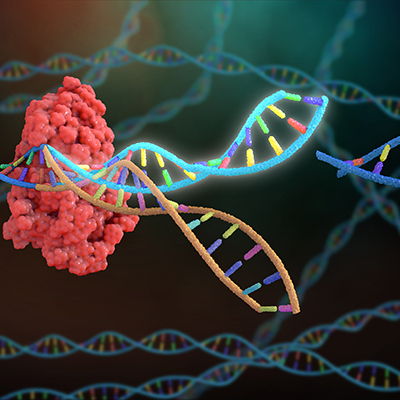 New approach puts genotype first
New approach puts genotype first
NIH researchers have published an assessment of 13 studies that took a genotype-first approach to patient care, in contrast to the more typical phenotype-first approach, which begins with clinical findings. The study, published January 5 in the journal American Journal of Human Genetics, demonstrated that a genotype-first approach can help identify people with uncommon disorders who might otherwise escape clinical attention. Read More
 Discovery of destructive CRISPR enzyme opens diagnostic, therapeutic applications for molecular scissors
Discovery of destructive CRISPR enzyme opens diagnostic, therapeutic applications for molecular scissors
The discovery of a CRISPR enzyme that destroys DNA and RNA in target cells has unlocked opportunities to use molecular scissors in diagnostics and to selectively destroy diseased cells. Read More
 Cancer-killing vaccine may also prevent brain cancer
Cancer-killing vaccine may also prevent brain cancer
Harvard Stem Cell Institute scientists are harnessing a new method of turning cancer cells into potent, anti-cancer agents. Their new cell therapy approach to eliminating established tumors also trains the immune system to prevent cancer from recurring, providing long-term immunity. The NIH-funded study, published January 4 in Science Translational Medicine, showed promising results when the approach was tested on mice with glioblastoma, a deadly brain cancer. Read More
 Prenetics acquiring majority stake in ACT Genomics, expanding position in cancer genetics, precision oncology
Prenetics acquiring majority stake in ACT Genomics, expanding position in cancer genetics, precision oncology
Hong Kong-based Prenetics Global, a genomics and diagnostic testing firm, on Friday announced that it is acquiring a majority stake in Taiwan-based precision oncology firm ACT Genomics. Read More
 Common genetic cause of late-onset ataxia revealed
Common genetic cause of late-onset ataxia revealed
A Quebec-led international collaboration has discovered a previously unknown common genetic cause of late-onset cerebellar ataxia. The study, published December 14 in the New England Journal of Medicine, may potentially improve diagnosis and open new treatment avenues for thousands of people with this debilitating neurodegenerative condition worldwide. Read More
 AMP assesses clinical implementation of past standards, guidelines for sequence variants in cancer
AMP assesses clinical implementation of past standards, guidelines for sequence variants in cancer
The Association for Molecular Pathology (AMP) on Tuesday announced that it has published a report to assess clinical adoption, identify classification inconsistencies, and evaluate implementation barriers for the 2017 report, “Standards and Guidelines for the Interpretation and Reporting of Sequence Variants in Cancer: A Joint Consensus Recommendation of the Association for Molecular Pathology, American Society of Clinical Oncology, and College of American Pathologists.” Read More
 CRISPR system targets toxic RNA to improve Huntington's in mice
CRISPR system targets toxic RNA to improve Huntington's in mice
Genome-editing CRISPR technology has reduced the toxic RNA that drives Huntington's disease in mice, providing preclinical proof of principle for a new way to treat the fatal neurodegenerative disorder, according to a study published on December 12 in Nature Neuroscience. Read More
 AI provides evidence that gene length explains age-related molecular changes
AI provides evidence that gene length explains age-related molecular changes
Artificial intelligence (AI) has helped Northwestern University researchers find evidence that the length of genes explains most of the molecular-level changes that occur during aging, which they contend could lead to therapeutics that slow or even reverse the process. Read More
 Functional genomics reveals gateway to intracellular targets for large molecules
Functional genomics reveals gateway to intracellular targets for large molecules
Complementary genome-scale, chemical-genetic approaches have revealed a cellular gateway that could allow large molecules to enter cells, providing new opportunities to develop drugs for intracellular targets, according to University of California San Francisco (UCSF) researchers. Read More
 CRISPR pioneer finds new genome-editing systems in analysis of viral genomes
CRISPR pioneer finds new genome-editing systems in analysis of viral genomes
The discovery of CRISPR-Cas enzymes in bacteriophages has revealed a new source of potential tools for editing the genome. Read More
Conferences
Science Briefs
Member Rewards
Earn points for contributing to market research. Redeem your points for merchandise, travel, or even to help your favorite charity.
Research Topics
Interact with an engaged, global community of your peers who come together to discuss their work and opportunities.
Connect
Tweets by @ScienceBoard






